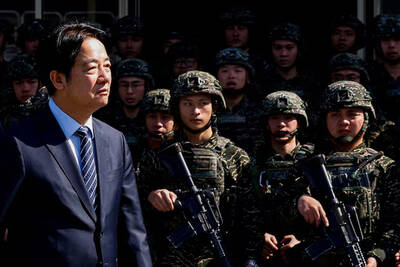Two researchers from National Central University said on Tuesday they had discovered a co-seismic effect in the ionosphere that they say could help detect tsunamis earlier.
Liu Jann-yeng (劉正彥) and Yen Horng-yuan (顏宏元), from the Department of Earth Science, said their research found that earth tremors could prompt a similar movement in the ionosphere, which can be monitored from the ground.
The ionosphere consists of several ionized layers 80km to 400km above the surface of the Earth.
An earth movement of 8m will be magnified and transformed into a vibration across 80km in the ionosphere, Liu said.
By monitoring the time and location of the vibration of the ionosphere, scientists may be able to determine the source of the earth movement, Liu said.
For example, he said, the research team used the data from vibrations in the ionosphere to pinpoint the epicenter of the 921 Earthquake in 1999, which had a magnitude of 7.3 and was centered 30km northeast of Jiji (集集), Nantou County.
Yen said the research has proved a correlation, called a co-seismic effect, between earthquakes and ionospheric vibrations and the latter might determine the source of a quake.
The movement of the surface of the sea causes similar ionospheric vibrations and by monitoring the latter, the source of the movement can be identified, he said.
The theory helped him work out the time and location of the 2004 Indian Ocean tsunami, Yen said.
The findings of the study could give forecasters about half an hour to an hour to issue a warning before a tsunami arrives, he said.
Yen said he was motivated to study the co-seismic effect between quakes and ionospheric movement after the 921 Earthquake, but when he first publicized his theory in 2005, it was greeted with skepticism.
The research team’s perseverance bore fruit when the Journal of Geophysical Research published the findings last month, he said.
The journal, published by the American Geophysical Union, is devoted to research on the physical, chemical and biological processes that contribute to the understanding of the Earth and its solar system.

The Taipei Mass Rapid Transit (MRT) Wanda-Zhonghe Line is 81.7 percent complete, with public opening targeted for the end of 2027, New Taipei City Mayor Hou You-yi (侯友宜) said today. Surrounding roads are to be open to the public by the end of next year, Hou said during an inspection of construction progress. The 9.5km line, featuring nine underground stations and one depot, is expected to connect Chiang Kai-shek Memorial Hall Station to Chukuang Station in New Taipei City’s Jhonghe District (中和). All 18 tunnels for the line are complete, while the main structures of the stations and depot are mostly finished, he

The first global hotel Keys Selection by the Michelin Guide includes four hotels in Taiwan, Michelin announced yesterday. All four received the “Michelin One Key,” indicating guests are to experience a “very special stay” at any of the locations as the establishments are “a true gem with personality. Service always goes the extra mile, and the hotel provides much more than others in its price range.” Of the four hotels, three are located in Taipei and one in Taichung. In Taipei, the One Key accolades were awarded to the Capella Taipei, Kimpton Da An Taipei and Mandarin Oriental Taipei. Capella Taipei was described by

Minister of Economic Affairs Kung Ming-hsin (龔明鑫) yesterday said that private-sector refiners are willing to stop buying Russian naphtha should the EU ask them to, after a group of non-governmental organizations, including the Centre for Research on Energy and Clean Air (CREA), criticized the nation’s continued business with the country. While Taiwan joined the US and its Western allies in putting broad sanctions on Russia after it invaded Ukraine in 2022, it did not explicitly ban imports of naphtha, a major hard-currency earner for Russia. While state-owned firms stopped importing Russian oil in 2023, there is no restriction on private companies to

President William Lai (賴清德) is expected to announce a new advanced “all-domain” air defense system to better defend against China when he gives his keynote national day speech today, four sources familiar with the matter said. Taiwan is ramping up defense spending and modernizing its armed forces, but faces a China that has a far larger military and is adding its own advanced new weapons such as stealth fighter jets, aircraft carriers and a huge array of missiles. Lai is expected to announce the air defense system dubbed “Taiwan Dome” in his speech this morning, one of the sources said. The system